I have not been able to find out much about “Tened en dios confianza,” nor about its author, José V. Estrada G. On a more personal note, however, this was the first hymn that I worked with when I started contemplating the Mexican Mission Hymns Project around six years ago. The original music for the hymn that I wrote was even one of the five I submitted for consideration with the new hymnbook.
Hymn Text
Table 1. Lyrics in the Spanish-language hymnals over the years.
| 1912 | 1942 |
| Si algún dolor acerbo, Vuestro ser devora ya, No perdáis jamás la calma, Al Eterno Dios rogad. | Si algún dolor acerbo, Vuestro ser devora ya; No perdáis jamás la calma, Al eterno Dios rogad. |
| Fe tened, y esperanza, Y así tendréis valor; Y tened en Dios confianza, El la ciencia os dará. | Fe tened y esperanza, Y así tendréis valor; Y tened en Dios confianza, El la ciencia os dará. |
| Mas no os dudéis de nada; El que duda, siempre es Como en el mar, la onda, En tinieblas morirá. | No dudéis de él en nada, El que duda, siempre es Como en el mar, la onda, En tinieblas morirá. |
| Y en esa fe sagrada, El orgullo no tengáis; Que la humildad es gracia, Y que nunca la perdáis. | Y en esa fe sagrada, El orgullo no tengáis; Que la humildad es gracia, Y que nunca la perdáis. |
| Queda siempre ensalzado, El que sufre por la fe, El que á su Dios implora Humillado no será. | Queda siempre ensalzado, El que sufre por la fe; El que á su Dios implora Humillado no será. |
Table 2. Text of my English translation compared with the 1912 Spanish text.
| 1912 Spanish | Prose English | Poetic English |
| Si algún dolor acerbo, Vuestro ser devora ya, No perdáis jamás la calma, Al Eterno Dios rogad. | If some bitter pain, Now devours your being, Never lose your calm, Pray to the Eternal God. | If your life is filled with aching, And your soul consumed by pain; Peace, be still, ev’n while you’re quaking Pray to God: He will sustain. |
| Fe tened y esperanza, Y así tendréis valor; Y tened en Dios confianza, El la ciencia os dará. | Have faith and hope, And so you will have courage; And trust in God, He will give you understanding. | Hold to faith and hope through trials, And your courage still will stand. Trust in God through all the miles, He will help you understand. |
| Mas no os dudéis de nada; El que duda, siempre es Como en el mar, la onda, En tinieblas morirá. | But do not doubt anything; The one who doubts is always As in the sea, the wave, In darkness he will die. | Do not doubt in God the Father— They who doubt are like the wave: Tossed about by wind and water, In the darkness is their grave. |
| Y en esa fe sagrada, El orgullo no tengáis; Que la humildad es gracia, Y que nunca la perdáis. | And in that sacred faith, Do not have pride; That humility is grace, And never lose it. | In the sacred faith, don’t waver: In humility abide. Through the grace of Christ, our Savior, You will never fall to pride. |
| Queda siempre ensalzado, El que sufre por la fe; El que á su Dios implora Humillado no será. | He is always exalted, The one who suffers because of faith; He who prays to his God Will not be humiliated. | If you suffer and stay faithful, Exaltation is your boon. Those who plead to Heav’nly Father Will not be confounded soon. |
Music
The hymn used two different pieces of music over the years. The first of these was a reference to Songs of Zion, No. 119, a tune intended for “Glorious Things of Thee Are Spoken”, by J. S. Hanecy:
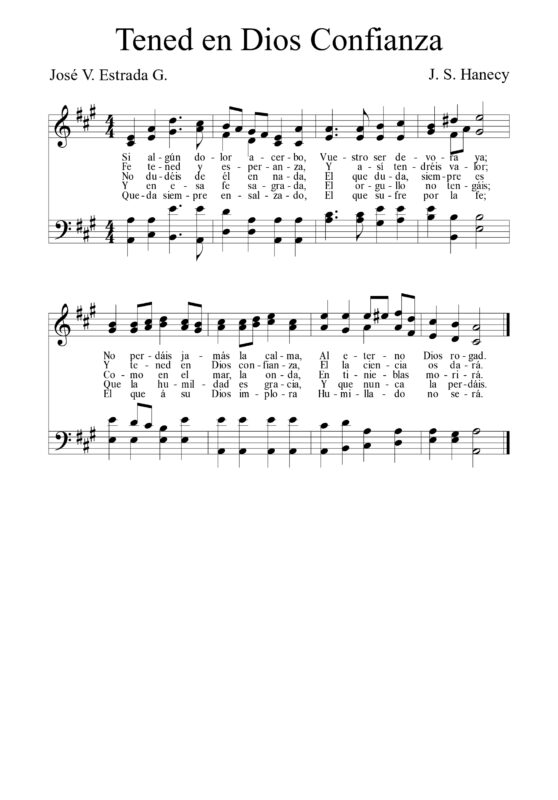
Here is the same tune with the English translation:
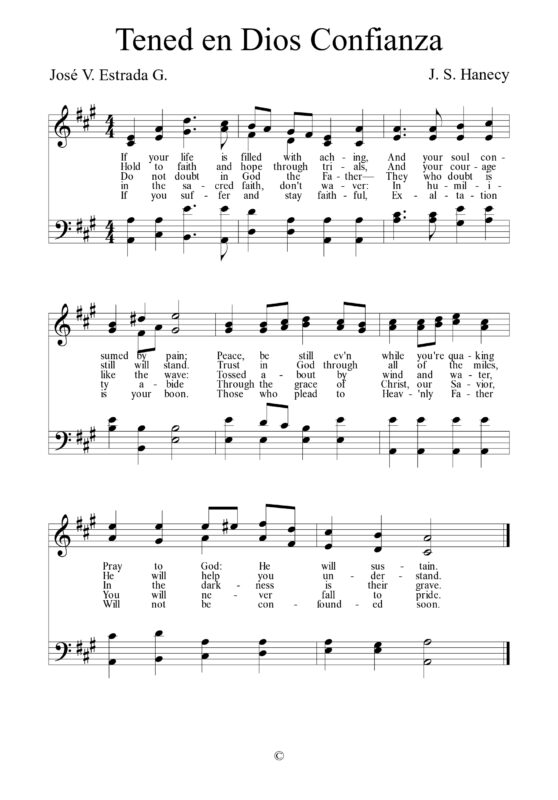
The second tune used with “Tened en dios confianza,” is Evan Steven’s tune for “O Awake! My Slumbering Minstrel.” This version is the one that was published in the 1942 Spanish hymnal.
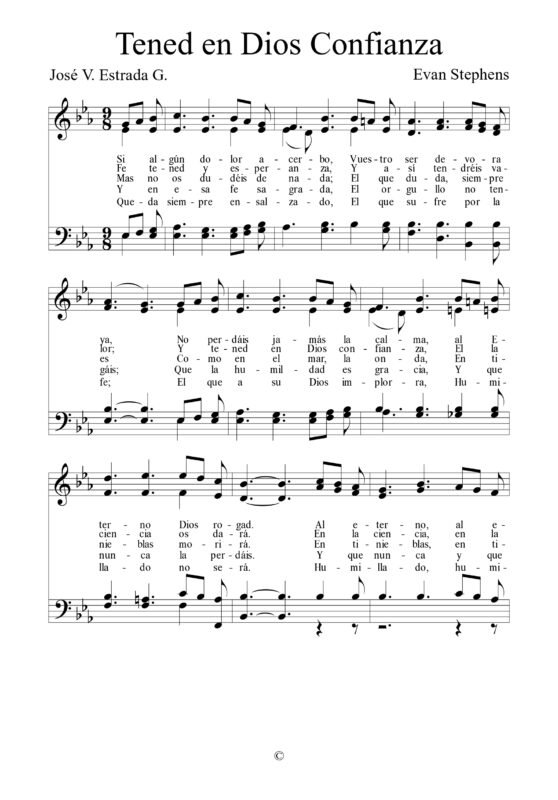
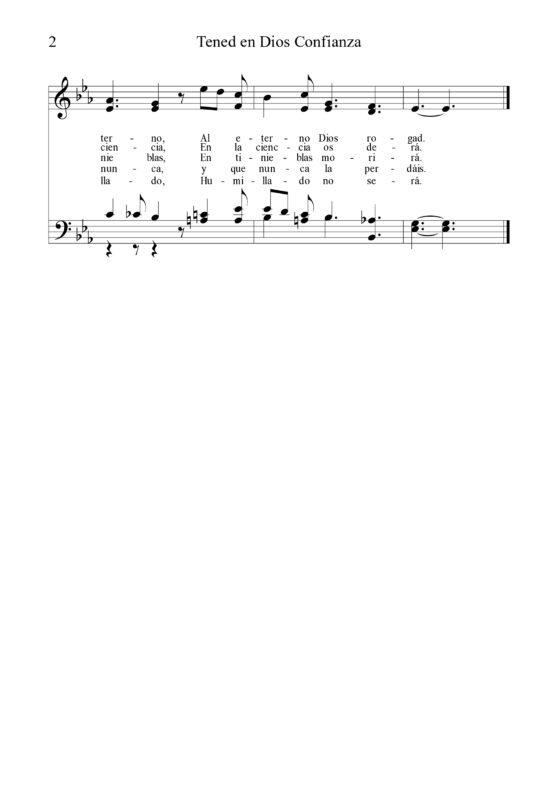
Here is the same tune with the English translation:
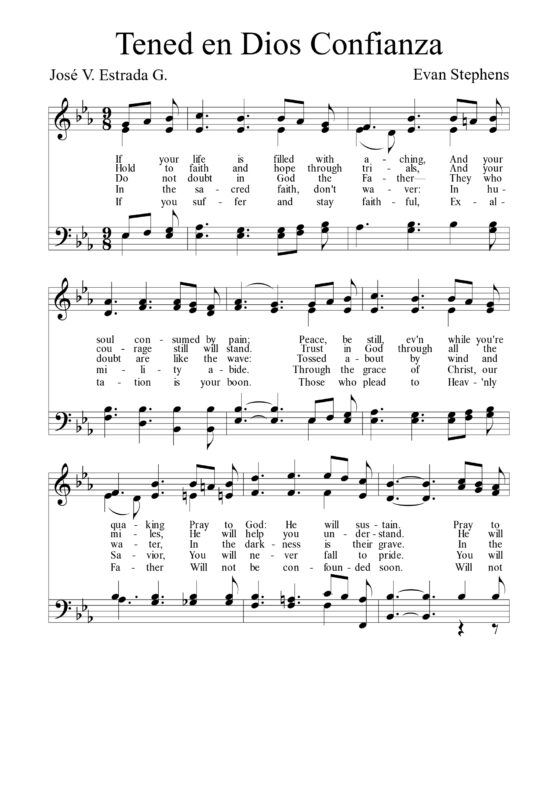
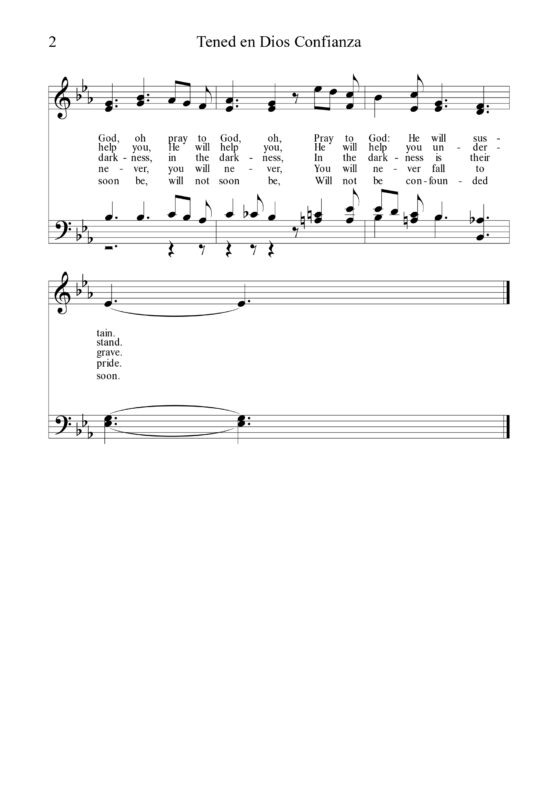
New Music
Here is the music I wrote to go with this hymn. As mentioned above, this was actually the first hymn I tackled for this project and was among the hymns I submitted for consideration with the new hymnal. The name of the hymn tune is “Ben Lomond,” after the mountain that overlooks Weber County, Utah (where I lived when it was written).
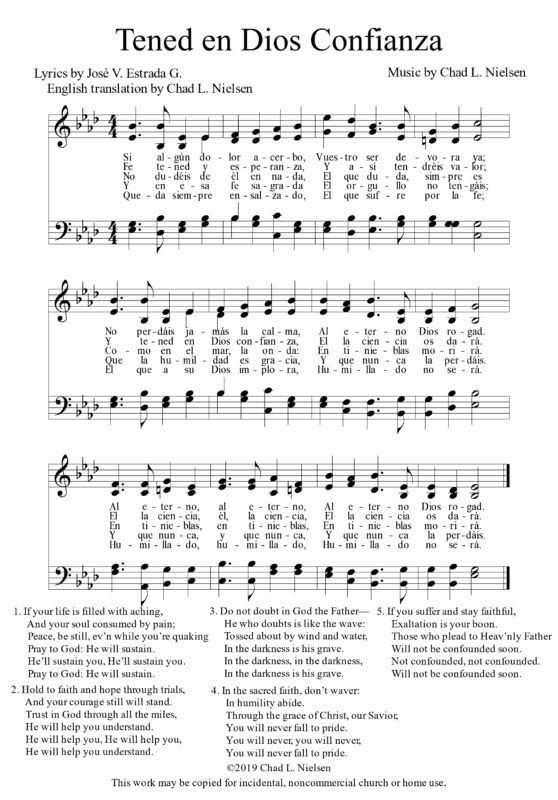

Comments
3 responses to ““Tened en Dios Confianza””
The new music you wrote seems like it wants to be in E-flat major, but the key signature indicates A-flat major. Probably intended to have three flats instead of four in the key signature, right?
It is in mixolydian mode. So, you can either add an additional flat to the key signature from the standard major (Ionian) mode or keep the key signature from the Ionian mode and manually add the flats that would be taken into account by the key signature change. The latter is more common, but the former makes more sense to me from an efficiency perspective.
Oh, gotcha. Thanks for the explanation!